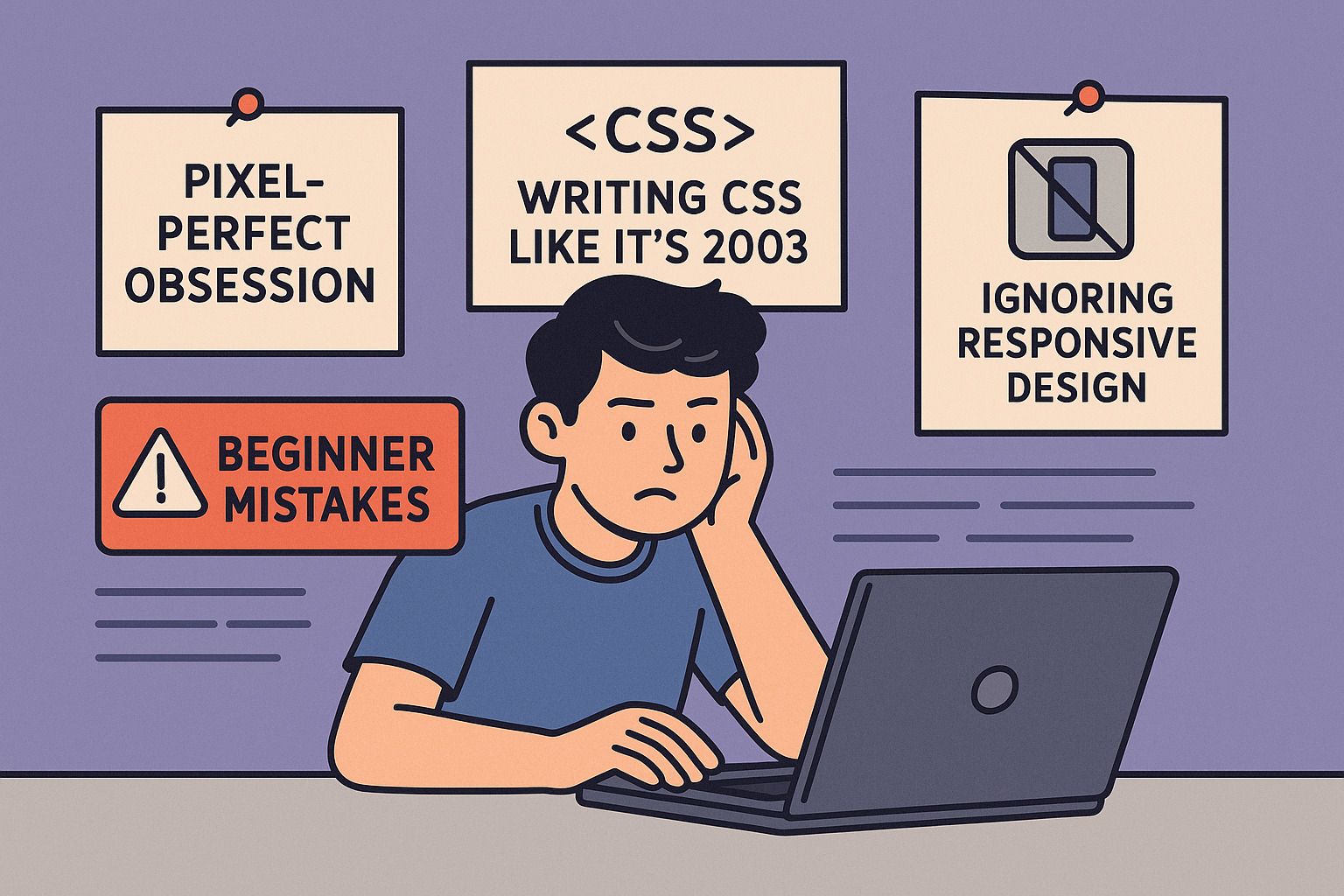Breaking into frontend development is exciting—you get to build the visible part of the web, the stuff people actually interact with. But it’s also a minefield of mistakes. And the worst part? You won’t even realize you’re making them until your codebase is crying and your motivation is on life support.
Let’s talk about the common pitfalls that every beginner frontend dev stumbles into (often repeatedly) and how to avoid turning your learning journey into a burnout spiral.
🧷 Pixel-Perfect Obsession: Welcome to Developer Burnout
You want that button to sit exactly 12.5px from the border? Zooming in to make sure everything aligns perfectly with the Figma design?
Stop.
Design is fluid across devices, browsers, and operating systems. Trying to match mockups pixel-for-pixel leads to frustration, not perfection. Embrace the 95% rule: if it looks good, behaves well, and serves the user—ship it.
Fix:
- Use layout systems like Flexbox and CSS Grid.
- Learn how designers think, but don’t try to be the designer.
- Focus on consistency, not cloning.
🧷 Writing CSS Like It’s 2003
Still using floats and position: absolute for layouts? Nesting selectors 12 layers deep? Mixing content with layout?
We’ve evolved. CSS isn’t just a mess of hacks anymore—it’s powerful, organized, and scalable if you let it be.
Fix:
- Learn and use modern CSS: Grid, Flexbox, custom properties (variables), and container queries.
- Follow methodologies like BEM or utility-first CSS (like Tailwind).
- Stop overusing
!important.
🧷Fear of JavaScript? It Shows
Some beginners avoid JavaScript like it’s an optional DLC. They stick to HTML/CSS and grab plugins for everything else. But eventually, you will need JavaScript—and if you’ve avoided it too long, even addEventListener will feel like black magic.
Fix:
- Learn vanilla JavaScript before jumping into frameworks.
- Understand the DOM, events, and how data flows.
- Don’t skip ES6+. It’s the foundation now.
🧷 Copy-Paste Coding Without Understanding
Yes, Stack Overflow is your best friend. But blindly pasting code you don’t understand creates tech debt faster than you can say “undefined is not a function.”
Fix:
- Treat every copy-paste as a learning opportunity.
- Ask: “What does this do?” “Why does it work?”
- Break it apart, tweak it, rewrite it.
🧷 Ignoring Responsive Design (Until It’s Too Late)
You design everything for a laptop, and only then check on mobile? Surprise—it’s a disaster. Fixing responsiveness after the fact is 3x the effort.
Fix:
- Start mobile-first.
- Use relative units (%,
em,rem). - Test on multiple screen sizes as you build.
🧷 Overengineering Simple Things
You made a dropdown… by using React, Redux, a context provider, two custom hooks, and a UI library? Overkill alert.
Beginners often equate complexity with skill. In reality, simplicity is harder and more valuable.
Fix:
- Ask: “What’s the simplest way to solve this?”
- Don’t add libraries or abstractions unless you need them.
- Prefer plain HTML/JS for small things.
🧷 Not Reading Browser DevTools Like a Holy Book
The browser devtools are your best debugging friend—but many beginners don’t even open them. If you’re still using alert() for debugging, we need to talk.
Fix:
- Learn how to inspect elements, monitor network requests, use console logs effectively, and profile performance.
- Get cozy with the Sources and Elements tabs.
- Use responsive mode in DevTools religiously.
🧷 No Git? No Backup Plan.
You’ve spent 6 hours coding, broke something, and can’t go back because you didn’t use Git. Yikes.
Not using version control is like doing surgery without backup.
Fix:
- Learn Git basics: init, commit, branch, push.
- Use GitHub, GitLab, or Bitbucket from day one.
- Commit often. Write messages you’ll understand in two weeks.
🧷 Thinking You’ll “Master” Frontend
Frontend isn’t a mountain you conquer—it’s a constantly changing landscape. There’s always a new framework, a new API, a new best practice.
Chasing mastery can be exhausting if you treat it like a finish line.
Fix:
- Aim for progress, not perfection.
- Focus on fundamentals. Frameworks come and go.
- Learn continuously, but take breaks. Burnout helps no one.
The good news? Every frontend developer has made these mistakes. It’s part of the learning curve. What matters is that you catch yourself, course correct, and keep building.
The web needs more thoughtful developers—not perfect ones 🚀

